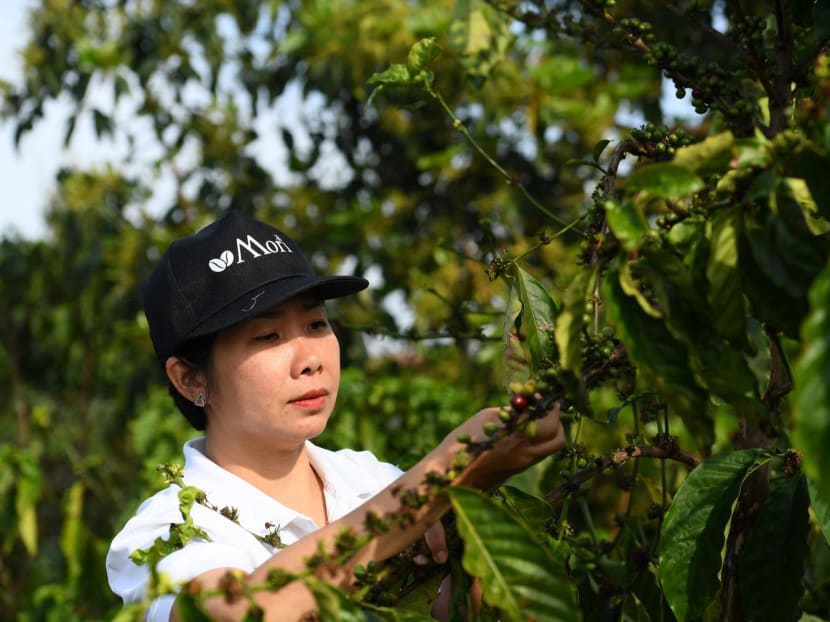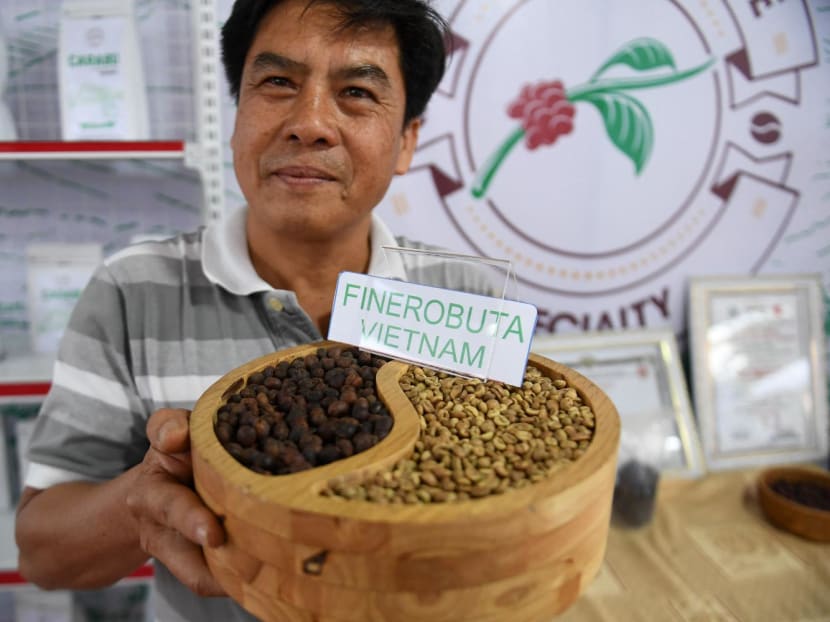Vietnam's robusta: The go-to coffee bean in a warmer world?
GIA LAI (Vietnam) — Bitter and earthy. Fit for instant brews only. Robusta coffee has a dire reputation, but a small group of farmers in Vietnam is trying to turn the bean's fortunes around as a warming world threatens the industry.

Ms Tran Thi Bich Ngoc checking on coffee cherries at Mori coffee farm in Plei Bau Can in Vietnam's central highlands, Gia Lai province
GIA LAI (Vietnam) — Bitter and earthy. Fit for instant brews only. Robusta coffee has a dire reputation, but a small group of farmers in Vietnam is trying to turn the bean's fortunes around as a warming world threatens the industry.
As an interior designer in trendy Ho Chi Minh City, Ms Tran Thi Bich Ngoc, 42, largely stayed clear of Vietnamese coffee, puzzling over why it didn't taste as good as cups from abroad.
Now, nearly a decade later, she runs her own coffee farm — "Mori" — in the remote Central Highlands, cultivating robusta she believes can match the world's favourite bean, arabica, in quality and flavour.
"My beans have a fruity, flowery smell, and they taste strong — but in a gentle way," Ms Ngoc told AFP at her farm close to the city of Pleiku, in the heart of the Vietnamese robusta region.
"Vietnamese farmers need to know it is possible to make these beans taste good."
‘VICIOUS CIRCLE OF BAD QUALITY’
Long scorned by giants such as Starbucks, robusta — which has almost double the caffeine content of arabica — is found in most instant coffees, as well as some espresso blends.
Most experts agree that the bean has potential, but is stuck in a "vicious circle of bad quality", said Mr Mario Fernandez of the Specialty Coffee Association.
"We get bad quality from robusta, therefore it gets a bad reputation, therefore no one wants to pay a premium for it, therefore there's no motivation to improve the quality," he said.
But robusta has advantages over its competitor: the yields are greater, and it can better cope with higher temperatures.
Climate change presents a serious concern for the multi-billion-dollar coffee industry, with scientists predicting lower yields and fewer areas suitable for growing.
Arabica, which makes up around 60 per cent of the world's coffee production, originates in the highlands of Ethiopia and South Sudan and prefers average annual temperatures of around 19°C
Robusta, although by no means immune to a warming world, may be able to endure up to around 23°C.
Should global production of arabica start to fall short, "people will have to find an alternative supply", said Ms Pham Thi Diep Giang, deputy director general of Trung Nguyen, one of Vietnam's top coffee brands.
A tumble in the arabica supply caused by extreme weather in Brazil already helped Vietnam earn US$4 billion (S$5.3 billion) in 2022, a 32 per cent rise from a year earlier, the government said in a recent report.
At a coffee fair in Buon Ma Thuot city, farmer Hoang Manh Hung tries his best to convince visitors to take sips of his "fruity and elegant" robusta.

"I really wish more people would love robusta, as it's truly a 'wow' drink," Mr Hung told AFP.
The 53-year-old transformed a farm that had produced low-quality coffee cherries for decades, first under the French and then his parents.
"We can now produce robusta with a completely different taste, and a scent that anyone would love," Mr Hung said.
Key to the change, Mr Hung said, is that the cherries are now hand-picked, and only when they're fully ripe.
"And they're fully organic," he added.
GAINING RECOGNITION
Robusta was first brought to Vietnam by the French in the late 19th century, and in 1991 the country exported its first beans — 104,000 tonnes.
By 2022, that figure had climbed to 1.8 million tonnes — almost all of it as raw material for instant coffee and other blends — making it the world's largest robusta producer and the second-largest coffee producer overall, after Brazil.
Still, outside the country, "Vietnam is regarded as the lowest-quality coffee there is", Mr Fernandez of the Specialty Coffee Association said.
Producers aiming for high quality will have "a harder time because of this perception", he added.
But there are some positive signs. The trend forecasting company WGSN says a change in attitudes toward robusta has already begun.
And Nguyen Coffee Supply — which says it is the first speciality Vietnamese coffee company in the United States — is now being sold by the high-end supermarket chain Whole Foods.
Meanwhile, at their hilly farms in Vietnam's Central Highlands, Mr Hung and Ms Ngoc are beginning to see their hard work pay off.
Their produce is gaining recognition domestically and is also being sold by online roasteries in Germany, the United States and elsewhere in Asia.
"It's the perfect time for Vietnamese fine beans to find their place in the world," Ms Ngoc said. AFP






